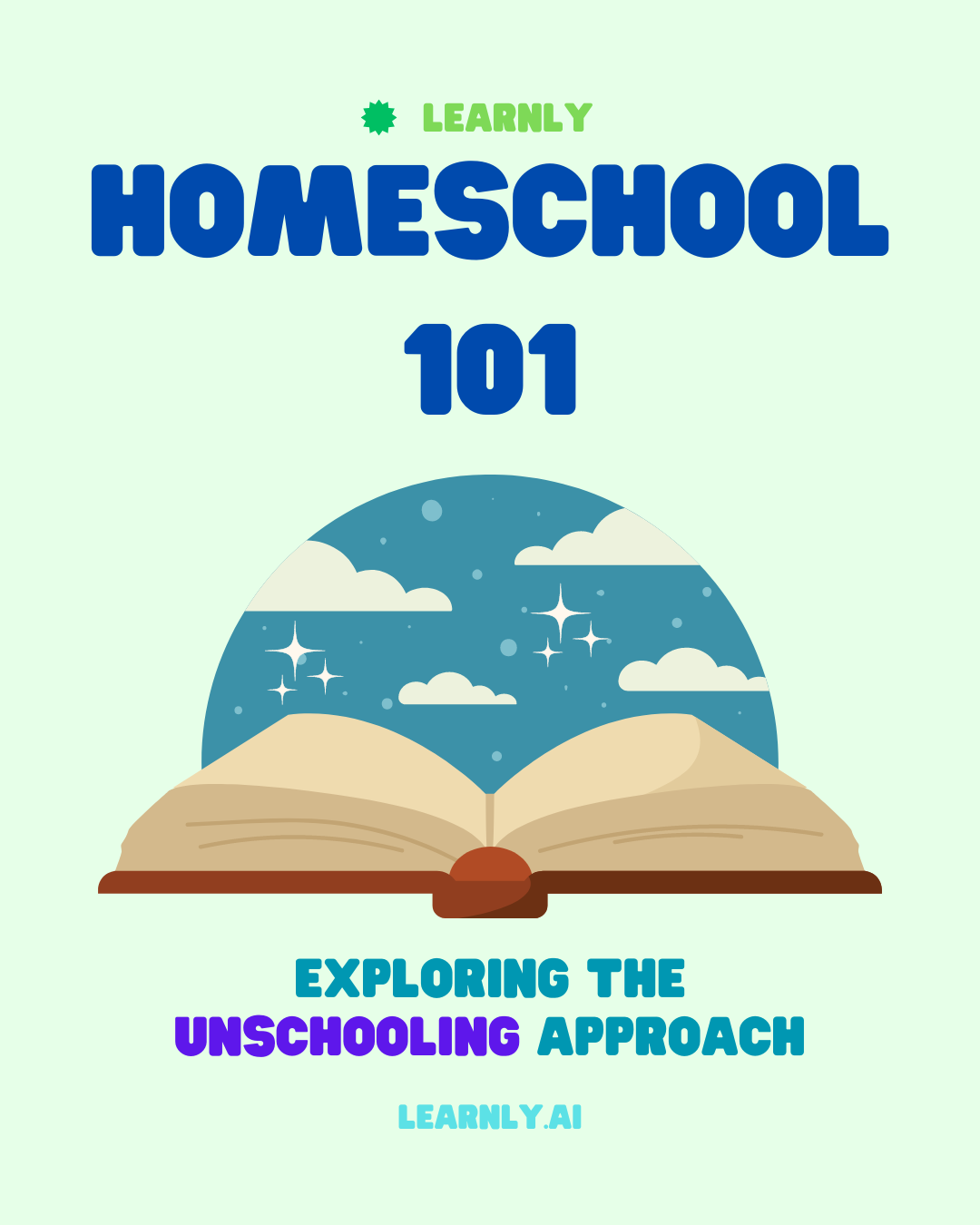Introduction to the Unschooling Approach to Homeschooling
Education is a fundamental aspect of life that shapes an individual's beliefs, values, and understanding of the world.
However, traditional schooling systems have long been criticized for their rigid curriculum, standardized testing, and lack of individualization.
In recent years, a new form of homeschooling has emerged that challenges these limitations and offers a more personalized, holistic approach to learning: unschooling.
Unschooling is a unique method of homeschooling that emphasizes a child's natural curiosity and self-directed learning.
Unlike traditional schooling, which often relies on textbooks and lectures, unschooling encourages children to explore their interests and pursue their passions through hands-on experiences, real-world learning, and independent research.
This approach allows children to develop a deep understanding of subjects that interest them and to learn at their own pace and in their own way.
One of the key principles of unschooling is trust.
Unschooling parents trust that their children will learn what they need to know when they need to know it, without the need for a predetermined curriculum or set schedule.
Instead, unschooling parents provide a supportive environment that encourages learning through play, exploration, and real-life experiences.
But how does unschooling actually work in practice?
What does a typical day look like for an unschooled child?
How do unschooling parents ensure their children meet academic standards and prepare for the future?
This series will dive deeper into unschooling homeschooling, exploring its principles, benefits, and challenges.
So whether you're a homeschooling parent curious about unschooling, or simply interested in exploring new approaches to education, join us as we embark on a journey into the world of unschooling.
What is the Unschooling Approach to Homeschooling?
Unschooling is not just a different educational approach - it's an entirely different philosophy.
Rather than viewing education as something that happens in a classroom, unschooling sees learning as an organic process that occurs throughout life.
As a result, unschooling parents believe that their children are capable of learning anything they need to know on their own as long as they have access to the resources and support they need.
One of the critical principles of unschooling is autonomy.
Unschooling children are free to explore their interests and passions without being forced to adhere to a specific curriculum or schedule.
This means they can spend as much time as they want to learn about fascinating topics without worrying about keeping up with the rest of the class.
Unschooling also encourages children to take responsibility for their own learning.
Instead of relying on a teacher to provide them with information, unschooling children are taught how to research, analyze, and synthesize information on their own.
This helps them develop critical thinking skills and a lifelong love of learning.
Another important aspect of unschooling is community involvement.
Unschooling families often seek opportunities for their children to learn from and contribute to their local communities.
This might involve volunteering at a local shelter, attending cultural events, or participating in community service projects.
While unschooling may seem unconventional, it has been shown to be a highly effective approach to education.
Unschooling children tend to be self-motivated, curious, and confident learners who often excel academically and professionally.
In fact, many unschooled children have attended prestigious universities and pursued successful careers in a wide range of fields.
Who Should Use the Unschooling Approach to Homeschooling?
Unschooling is an ideal option for families looking for a more flexible and personalized approach to education.
Suppose you're the type of parent who believes every child learns differently and has unique interests and strengths.
In that case, unschooling might be the perfect fit for your family.
Unschooling is also suitable for families prioritizing hands-on learning and real-world experiences.
If you're passionate about outdoor education, community involvement, or travel, unschooling can provide the freedom and flexibility you need to incorporate these experiences into your child's education.
Unschooling is ideal for families who value self-directed learning and independence.
Moreover, assuming you want your child to be able to explore their own interests and passions without being constrained by a predetermined curriculum or schedule.
In that case, unschooling can give them the freedom to do so.
Unschooling can also be a great fit for families who want to create a strong family bond through shared experiences and a focus on relationships.
Because unschooling allows for more time together as a family, it can help create a strong sense of community and shared purpose that extends beyond the classroom.
Finally, unschooling is a good choice for families who want to take a more holistic approach to education that emphasizes academic success and emotional and social well-being.
By prioritizing self-care, emotional intelligence, and community involvement, unschooling can help children develop into well-rounded, empathetic, and confident individuals.
Why Choose the Unschooling Approach to Homeschooling?
Unschooling offers a more natural and organic approach to learning that can help children develop a love of learning that lasts a lifetime.
In addition, by allowing children to explore their interests and passions, unschooling can help them discover their unique talents and strengths and foster a sense of curiosity and wonder about the world around them.
Unschooling can also be a more effective way to help children learn essential life skills, such as critical thinking, problem-solving, and communication.
By giving children the freedom to pursue their own interests and develop their own projects, unschooling encourages independent thinking and creative problem-solving.
Unschooling can help children develop a strong sense of self-confidence and self-esteem.
So, by allowing children to take ownership of their own learning, unschooling helps them build a sense of independence and self-efficacy that can carry over into other areas of their lives.
Unschooling can also be a more affordable and flexible way to homeschool.
Because unschooling doesn't require a set curriculum or materials, families can often save money on educational resources and materials.
And because unschooling allows for more flexibility and autonomy, families can tailor their schedules to fit their unique needs and lifestyles.
Finally, unschooling can be a powerful way to help children develop a sense of purpose and passion in their lives.
It's in nurturing them to explore their interests and pursue their goals; unschooling helps children develop a strong sense of purpose and direction that can help guide them throughout their lives.
How to Use the Unschooling Approach to Homeschooling
The key to using the unschooling approach to homeschooling is to let go of the idea that you need to control your child's education.
Instead, embrace the idea that your child can direct their own learning and that your role as a parent is to provide support and guidance.
Start by identifying your child's interests and passions.
What are they curious about?
What are they excited to learn more about?
Then, use these interests as a starting point for your child's learning journey and encourage them to explore these topics in-depth.
Provide your child access to various resources and materials, such as books, documentaries, online resources, and community organizations.
Encourage them to use these resources to pursue their own interests and projects, and provide them with support and guidance as needed.
Inspire your child to take ownership of their learning by setting goals, tracking progress, and reflecting on their experiences.
Help them develop a sense of accountability and responsibility for their learning while providing a safe and supportive environment where they can make mistakes and learn from them.
Finally, stay engaged and involved in your child's learning journey by regularly checking in, providing feedback and support, and helping them connect their learning and the real world.
Embrace the idea that learning doesn't just happen in a classroom but can occur anywhere, at any time, and encourage your child to take advantage of life's learning opportunities.
Conclusion
In conclusion, unschooling is a unique educational approach that prioritizes self-directed learning and encourages students to explore their interests and passions.
Unlike traditional schooling, unschooling does not rely on a set curriculum or formal structure.
Instead, it allows students to learn through real-world experiences, personal projects, and self-guided exploration.
Unschooling can be a challenging and unconventional approach to education.
Still, it can also be incredibly rewarding for students who thrive in a more flexible and personalized learning environment.
By allowing students to take ownership of their education and pursue their interests at their own pace, unschooling can foster creativity, independence, and a lifelong love of learning.
While unschooling may not be the right fit for every student or family, it is important to recognize that there are many different paths to education and that unschooling can be a valid and effective alternative to traditional schooling.
Whether you choose to unschool or not, the most important thing is to prioritize your child's individual needs and interests and to support them in their journey to becoming lifelong learners.
Resources & Tools
Here are some resources and tools that can help readers learn more about unschooling:
-
Unschooling.com - a website dedicated to unschooling resources and support, including articles, forums, and a directory of unschooling groups and communities.
-
Unschoolers.org - a nonprofit organization that provides information and resources about unschooling, as well as opportunities for networking and support.
-
Homeschooling and Unschooling Facebook Groups - There are many Facebook groups dedicated to unschooling and homeschooling, where parents can connect with other families, ask questions, and share resources.
-
Unschooling Blogs - There are many unschooling blogs written by experienced unschoolers and homeschoolers that provide insights, tips, and resources for unschooling families.
-
Books about Unschooling - There are many books about unschooling that provide inspiration and guidance, including "The Unschooling Handbook" by Mary Griffith and "Free to Learn" by Peter Gray.
-
Podcasts - There are many podcasts about unschooling that provide insights and inspiration, including "Exploring Unschooling" and "The Unschooling Life".
-
Local Homeschooling and Unschooling Groups - Check with your local homeschooling or unschooling groups for resources and support in your area. Many cities have local homeschooling groups that organize events and activities for homeschooling families.
-
Online Homeschooling Platforms - Platforms like Khan Academy, Outschool, and Udemy can offer a wide range of educational materials, classes and resources.
-
Online Learning Resources - Websites like Coursera, edX, and OpenCulture offer free courses from top universities and resources to keep up with new educational developments.
These resources and tools can be valuable for those interested in learning more about unschooling, and can help parents make informed decisions about their child's education.
/>





